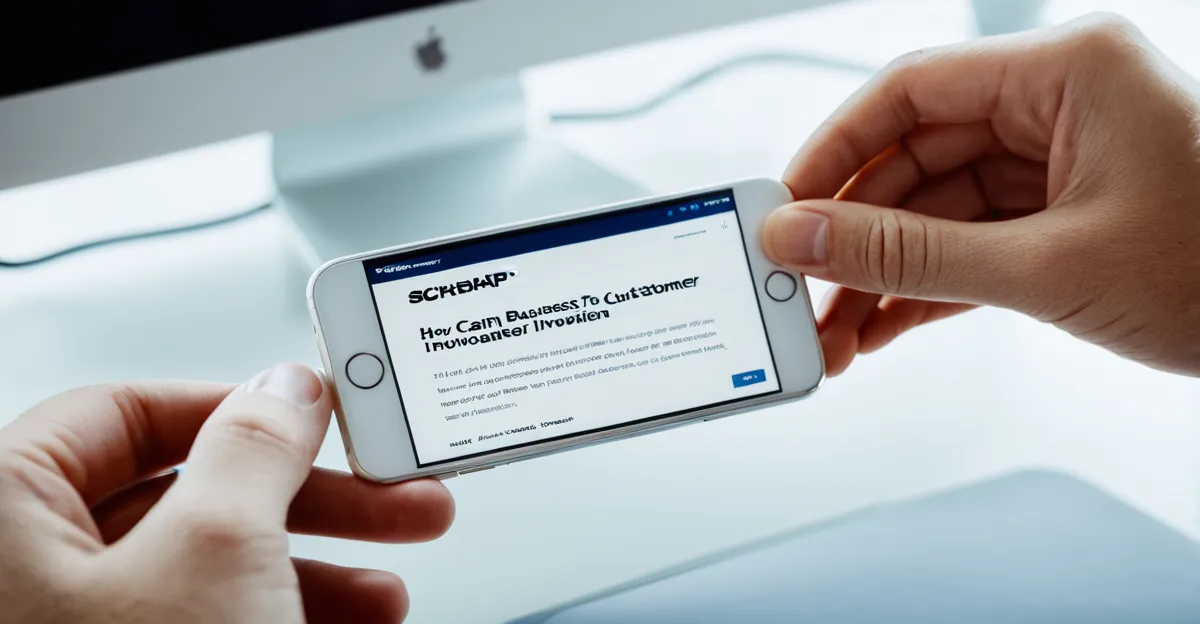Actionable strategies for improving customer loyalty through digital transformation
Digital transformation strategies are key to boosting customer loyalty in today’s competitive UK business technology landscape. One effective approach is implementing Customer Relationship Management (CRM) systems. These platforms allow businesses to tailor interactions, creating personalised customer engagement that resonates and builds trust. Through CRM, companies gain a comprehensive view of customer preferences and history, enabling timely, relevant communication.
Another powerful strategy involves utilising data analytics. By analysing customer behavior and purchase patterns, businesses can anticipate needs and proactively address issues. This insight supports smarter decision-making, enhancing customer satisfaction and fostering loyalty. Data-driven strategies not only improve engagement but also streamline marketing efforts and resource allocation.
Have you seen this : What innovative computing tools are UK marketers adopting?
Mobile technology also plays a pivotal role. Introducing mobile loyalty apps and digital rewards makes loyalty programs more accessible and engaging. Customers enjoy the convenience of tracking points, redeeming rewards, and receiving exclusive offers through their smartphones. This seamless integration of technology meets modern expectations and strengthens brand affinity.
Together, these digital transformation strategies form a robust framework to improve customer loyalty, reflecting the best practices UK businesses can adopt to thrive in a tech-driven marketplace.
Also read : How can UK businesses enhance marketing personalization through IoT?
Digital tools and technologies enhancing UK customer loyalty
In the UK, customer loyalty technology is rapidly evolving, with businesses increasingly adopting sophisticated CRM tools to deepen relationships. Leading CRM software, such as Salesforce and HubSpot, dominate the market by enabling detailed customer insights and personalized communication, critical for loyalty. These platforms allow seamless integration of customer data across channels, providing a 360-degree view that enhances retention strategies.
Moreover, the rise of digital engagement platforms enables UK companies to maintain consistent interaction through email, social media, and SMS. The integration of omnichannel communication ensures customers experience a unified message regardless of their chosen touchpoint, significantly boosting engagement and loyalty.
Loyalty apps designed specifically for the UK consumer base are gaining traction, offering tailored rewards and easy redemption options. These apps not only incentivize repeat business but also collect valuable user data to refine future campaigns. By combining customer loyalty technology UK with loyalty management apps and digital engagement platforms, UK businesses create responsive ecosystems that adapt to consumer behavior, fostering long-term commitment with measurable success.
Real-world examples: UK businesses succeeding with digital transformation
UK digital transformation case studies reveal how businesses use innovation to boost customer engagement. One retailer, for example, harnessed personalisation combined with a mobile app to revolutionise its loyalty program. By tailoring offers based on past purchases and preferences, this approach increased repeat visits and customer satisfaction. The convenience of the app allowed shoppers to access rewards instantly, making participation seamless and appealing.
Another compelling UK business example involves a service provider that enhanced customer retention through automated journeys. By integrating data analytics with marketing automation tools, the company crafted timely, relevant communications sent directly to customers at key points in their lifecycle. This proactive strategy reduced churn and fostered a stronger emotional connection with clients.
Both cases demonstrate the power of successful digital loyalty programs in retaining customers. Personalisation, combined with mobile technology and automation, creates engaging, customer-centric experiences. These UK digital transformation case studies show that embracing technology is not just about efficiency but building loyalty and long-term business success.
Step-by-step approach to launching digital customer loyalty initiatives
Launching a successful digital customer loyalty rollout in the UK begins with assessing current customer touchpoints. UK businesses must identify where digital gaps exist—whether in mobile apps, online shopping, or in-store interactions. Understanding these gaps highlights opportunities for improvement and tailors loyalty tactics to customer behaviour patterns.
Next, the planning phase focuses on selecting appropriate digital tools that integrate smoothly with existing systems. Piloting loyalty programs lets businesses test features like rewards tracking or personalised offers on a small scale. This stage ensures the solutions resonate with customers and meet business objectives before a full-scale launch.
Finally, measurement and iteration are critical. Using data analytics to evaluate engagement and redemption rates provides clear insights into what is working. Continuous improvement cycles include refining program rules, enhancing user experience, and adapting to emerging trends in digital transformation implementation UK strategies. By following these customer loyalty rollout steps, UK businesses can create more engaged customers and build long-term loyalty effectively.
Measurable benefits and outcomes of digital transformation in customer loyalty
Digital transformation significantly enhances customer loyalty benefits by increasing repeat purchase rates and boosting customer lifetime value. Businesses adopting digital tools often see a clear improvement in how often customers return, directly impacting revenue growth. Improved loyalty metrics, such as Net Promoter Scores and customer satisfaction indexes, reflect deeper, more positive engagement.
Implementing digital solutions also enables real-time collection and analysis of customer feedback, which drives tailored experiences that foster loyalty. For example, personalized offers and seamless mobile app interactions contribute to higher satisfaction scores. These metrics serve as tangible evidence of the value digital transformation adds.
From a financial perspective, investing in digital initiatives yields a strong digital transformation ROI UK for companies looking to optimize loyalty strategies. Streamlining operations through automation and data-driven decision-making reduces costs, allowing resources to focus on enhancing customer relationships. This operational efficiency underpins sustainable loyalty improvements.
In essence, the measurable outcomes include both enhanced customer retention and meaningful cost savings, making the case for digital transformation within customer loyalty frameworks compelling and data-driven.
Trends and expert tips for sustained digital loyalty growth
Insights for UK marketers navigating evolving customer expectations
The customer loyalty trends UK reveal a significant shift toward AI-driven personalisation. Businesses now harness intelligent algorithms to deliver tailored experiences, increasing engagement and retention. Alongside this, chatbot engagement has surged, providing instant, 24/7 customer support that enriches interaction without overwhelming staff.
Implementing these technologies requires strategic digital transformation tips focusing on organisational change management. Experts highlight the importance of comprehensive staff training programs to equip teams with skills to operate and optimize new digital tools. Clear communication about the benefits and impacts of transformation helps reduce resistance, fostering a culture accepting of innovation.
Meanwhile, adherence to UK-specific data privacy regulations is non-negotiable. Ensuring compliance with laws such as GDPR protects customer trust and avoids costly penalties. Best practices include transparent data usage policies and incorporating privacy by design in loyalty program development.
By embracing these customer loyalty trends UK and following sound expert advice UK marketing professionals offer on training and compliance, brands can build durable, trust-based digital loyalty programs that thrive amid evolving market demands.




